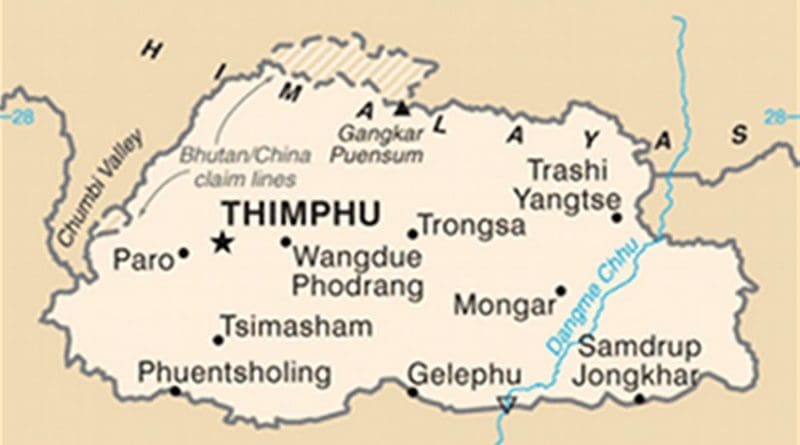Bhutan: Recent Developments – Analysis
By SAAG
By Dr. S.Chandrasekharan
Bhutan was declared as the most peaceful country in this region and is ranked 13th among the 163 countries in the world on the Global Peace Index. This index is compiled periodically by the Institute for economics and peace ( IEP).
This position was not at all surprising and credit should go to all those in the country who have focussed on the Gross National Happiness rather than on other economic indicators. Many in the country had in the past tried to quantify in terms of numbers the GNH and this could be misleading. One should only visit the country not only the urban centres but also remote accessible places to feel the happiness of the people in Bhutan.
An interesting question was posed recently by one Dasho Chewang Rinzin, Managing Director of Druk Green Power corporation on the question of GNH. He asked the audience in one of the meetings whether they want GNH and be the poorest country in the world or whether they want to be rich enough to be happy.
Surprisingly, he opted for the latter that one should be rich enough to be happy! It looks that he has not understood the real import of GNH. Another mistake being made generally is that GNH is being equated to closely following the “middle path” of Buddhism which in turn is also misinterpreted as the median position on any issue.
On 5th of July the Prime Minister presented his customary “state of the nation” report to the Parliament and this year he focussed on the 2015 GNH survey. This survey presumably found the urban people happier than the ones in the remote villages. This cannot be true unless the authorities had totally abandoned the remote regions to the vagaries of nature. It has been my experience in Nepal that people in remote and inaccessible villages were happier and content with their situation that the urban ones who were being pampered by the government in power.
But the state of the nation report of the PM based on gross national happiness did give an idea of what he meant by happiness. He cited the progress made in Health care, Education, steps taken to improve the living standards, preservation of Environment, rural development and above all sustained efforts made to preserve their religion and culture.
The PM highlighted the progress made of five “economic jewels” as that of the hydro power, Agriculture, Tourism, Cottage and Small Industries and Mining.
In the case of hydro power development- some points that need to be noted
- For the first time, Bangladesh has been invited to invest in hydro power development in Bhutan and a trilateral cooperation among Bhutan, Bangladesh and India that will enable Bangladesh to re import the electricity could soon be a reality. The project referred to is the 1125 MW Dorjilung hydro power project in Lhuentse. An investment of over USD 1 Billion from Bangladesh is expected. This is a welcome sign.
- Bhutan is seen to be importing fossil fuel almost equivalent to the hydro power export. Last year the hydro power export to India was 7.7 billion and import of fossil fuel was 7.3 Billion. In lay man’s terms, Bhutan is exporting clean fuel and instead imported an equivalent environment polluting fuel to maintain its economy. This is an anomalus situation that need to be looked into urgently and comprehensively.
- The target of 10000 MW of hydro power by 2020 is not likely to be reached. The National Council has made some important suggestions in the development of hydro power energy that involved revisiting some of the existing projects. This needs to be looked into. One important suggestion is for incorporating provisions for local employment, use of local services and services. One other is the involvement of local Bhutanese and local consulting firms in the preparation of the DPR.
There is no doubt that there has been great all round progress in Bhutan. The King in his address in the closing ceremony of the 7th session of the parliament observed that the parliamentarians have carried out their responsibilities dutifully and well. In the course of the last decade, the King pointed out that the country was getting smaller due to increased connectivity. The people are better educated and more confident than ever before and the institutions are getting stronger. Above all tremendous work has been done to lay a firm foundation for democracy.
It is the last one in strengthening democracy that Bhutan is doing well. Premier Tobgay as in the case of a chief executive of any country has his full measure of the problems. First, he has to contend with the monarchy which happily in his case is benign and generally non interfering. He has to contend with an aggressive opposition who some times make unjustified accusations. Then there is the National Council who has taken upon itself as another opposition not realising that statutorily they are there to help the government to run better. There is then the problem of dealing with India particularly the Indian diplomats. ( Try to get an appointment with an Indian Ambassador on your own!). There is then the ever persisting Chinese intrusions.
Someone rather unfairly described the role of the Prime Minister in Bhutan as nothing but a “glorified Chief Secretary.” This is absolutely not true.

